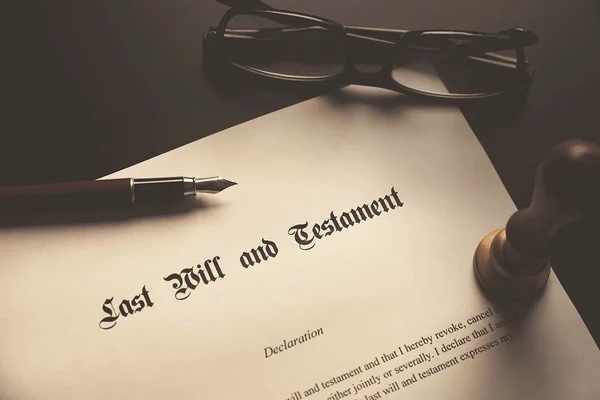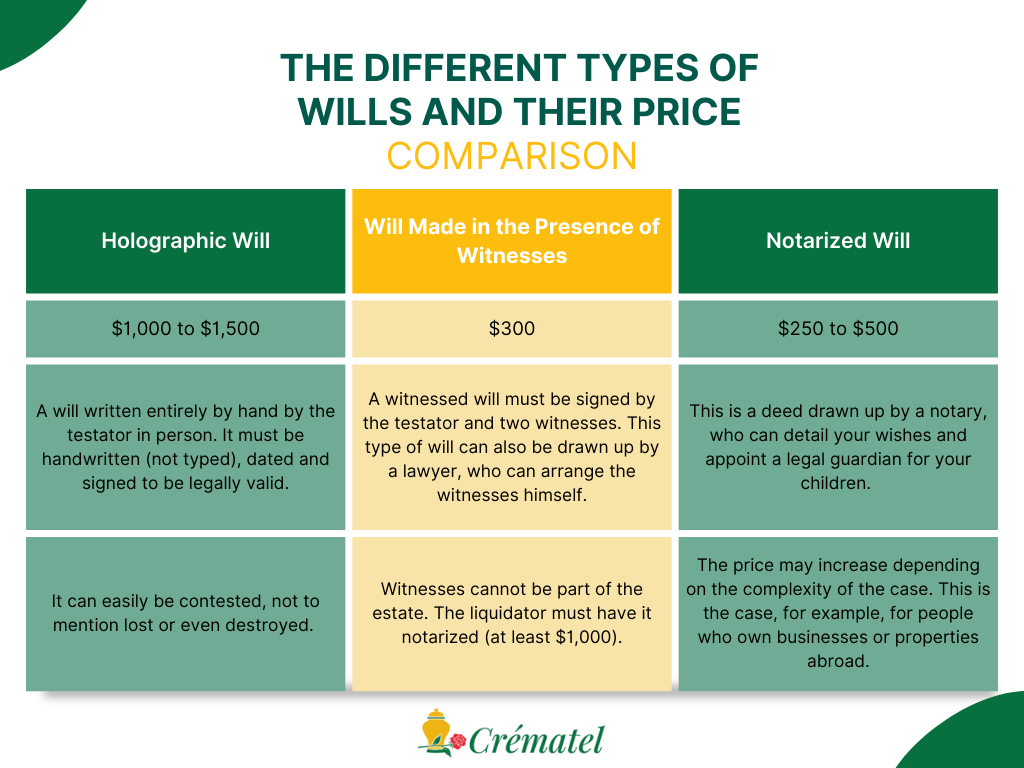
Finding the deceased’s will is an essential part of the inheritance settlement. In fact, the Civil Code of Quebec stipulates that the liquidator must retrace the deceased’s last wishes. But how to proceed to a will search, and what are the related costs? We present the different options available to you and the type of will that your loved one might have left behind.
The Different Ways to Proceed to a Will Search and their Related Costs
With the Chambre des notaires and the Bar of Quebec
This method will allow you to retrace any notarized will or will written up by a lawyer. If the will was entrusted to a lawyer, you can find it through the Will and Mandate Register from the Bar of Quebec (Barreau du Québec). If it was entrusted to a notary, you will find it through the Chambre des notaires of Quebec.
To proceed to an online will search request, the cost is $ 17.25, tax included. You can also place your request by mail or in person for $ 23. For your request to be accepted, you will need an official proof of death.
When proceeding to a will search with the Bar of Quebec or the Chambre des notaires, you will receive proof of the existence ‒or lack thereof- of a registered will, along with the contact information for the notary or the lawyer who has it in their possession. You will then have to contact that person and place a request to receive the will. Find out more about how to proceed to a will search.
With the Help of a Notary
The price for a will search executed by a notary is more expensive, but it generally includes a full consultation, which includes indications on how to better understand the different steps of the inheritance process. How much does a will search conducted by a notary cost? It generally costs around $ 200, which includes the consultation.
The notary will take care of contacting the Bar of Quebec and the Chamber of Commerce. This is a good option for greater peace of mind or to help guide you throughout the process.
Searching through the Deceased’s Documents
The deceased’s documents might include the original of the will or the contact information for the notary or the lawyer who has it in their possession, which could help avoid costs related to the search.
If there is no registered will, you will have to look for a handwritten will or one that was completed in the presence of witnesses. If you find this type of will in the deceased’s documents, you will still have to bring it to a notary, so that they can proceed to the verification of the will. The notary will have to confirm that these are indeed the deceased’s last wishes and that the document is legally valid.
This type of will search does not cost anything, although you might have to pay notary fees to have it recognized.
Where Would One Generally Find the Original of a Will?
The original of a will is generally found with the notary or the lawyer who wrote it. If it was completed by a lawyer, the information transferred to the Bar (Barreau du Québec) includes:
- The first and last name of the testator or mandator
- Their occupation
- Their address
- The date it was written
- The name and contact information for the lawyer who registered it
If the lawyer in question handed it over to another lawyer, to the testator or mandator, this information will also be indicated.
Who has the Right to See the Will?
A will is a private document to which very little people have access. The liquidator is generally the only person who is allowed to look at the will, though some people might be able to receive a complete or partial copy. These people must place a request with the liquidator.
The people who have the right to a copy are the universal legatees, or in other words those who inherit the entire residuary estate as a universal heir (meaning they inherit a body of assets). If you only receive one specific asset, you will probably have access to only the part of the will that concerns you.
Take note that this can exclude legal heirs, if the deceased has chosen not to leave them any assets.
Legal Recourse in the Event that You Can’t Find a Will
Have you tried all of the different methods of searching for a will but have still come up empty? In this case, you will have to meet with a notary to proceed to an ab intestate succession. This refers to a succession without a will, as stated in the Civil Code of Quebec.
What Does a Will Generally Include?
As a general rule, a will contains:
- The name of the heir(s).
- The way the assets are to be distributed.
- The name of the liquidator and his/her replacement, along with the way the liquidator is to be compensated, if applicable.
- The person responsible for the children (legal guardian), if applicable.
There can be some legal mechanisms like a fiduciary; the powers of the liquidator can also be extended beyond what is stated by the law. The liquidator might, for example, have the right to sell the deceased’s assets.
The Different Types of Wills and their Price

The Holographic Will
When a person wants their last wishes to be known without having to turn to a notary or a lawyer, they can choose to do so by writing a holographic will. This is a will that is completely handwritten by the testator themselves. It must absolutely be written by hand (and not on a computer), dated and signed in order to be legally valid.
This type of will does not cost anything for the person who makes it. However, fees of $ 1,000 to $ 1,500 will be necessary to have it probated. Moreover, it can easily be contested, without forgetting that it can get lost or be destroyed.
A Will Made in the Presence of Witnesses
A will made in the presence of witnesses must be signed by the testator and two witnesses. However, these witnesses cannot be part of the succession. The text can be written on the computer, as long as the signatures are completed by hand.
This type of will call also be written by a lawyer, who can also provide the witnesses. This way, you will be sure that the document is legally valid, that it will be kept in a safe place and that it can be retraced by the Bar.
This type of will costs at least $ 300 to produce, depending on the lawyer’s hourly fees. Moreover, the liquidator will have to have the will authenticated by a notary (at least $ 1,000).
Notarized Will
A notarized will is the only will that does not need to be probated to be considered authentic. This is a document written by a notary, who can detail your last wishes and designate a legal guardian for your children. This type of will generally costs between $ 250 and $ 500, but the price can increase depending on the complexity of the will. This is the case, for example, for people who own one or several companies, or have assets abroad.
A notarized will is the safest and most advantageous type of will. If you want to make sure that your last wishes are respected, we also suggest that you opt for our funeral services. At Crématel in Saint-Jérôme, we offer advantageous funeral prearrangement packages. Take a look online, and book an appointment with one of our counselors.

Leave A Comment